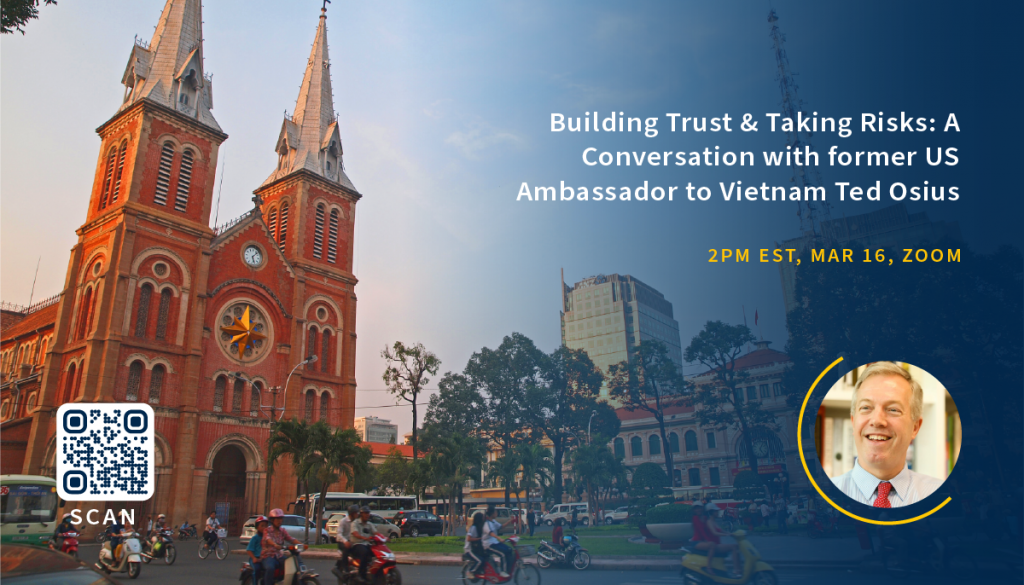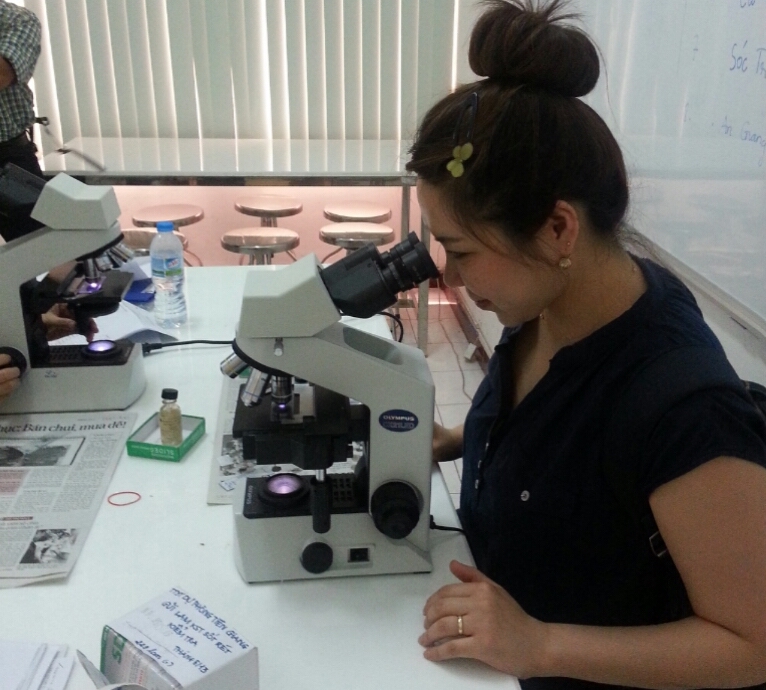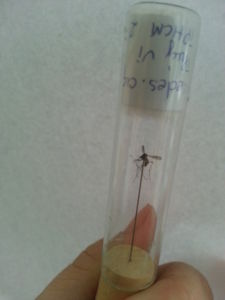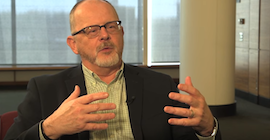Solagron is a Vietnamese company producing various types of microalgae using solar power. A team of MBA students identified priority markets and developed marketing recommendations for this company’s new line of human consumption products, based mainly on spirulina production on a large scale.
WDI continues to expand the company’s wind energy artificial intelligence (AI) and internet of things (IoT) products to extend operations in other geographic markets. WDI is working with connections in different countries to identify specific opportunities for Vietnam.
WDI is partnering with the FPT School of Business & Technology’s business school, FPT, on a new general management certificate program: the Advanced MiniMBA program. The program is running in the fall of 2024 and combines online instruction with in-person training in Vietnam. Topics covered are competition, marketing, finance, strategy and leadership.
Note: A recording of the event is now available.
The William Davidson Institute (WDI) will host a discussion with Ted Osius, former U.S. Ambassador to Vietnam and leader of the US-ASEAN Business Council. He will discuss Vietnam’s economic transformation and the skills necessary to succeed in cross-cultural business. The talk, “Building Trust and Taking Risks,” is set for 2 p.m. March 16, via Zoom. (Register here.)
A diplomat for 30 years, Osius served from 2014 to 2017 as U.S. ambassador to Vietnam during the Obama Administration. Leading a team of 900, Osius devised and implemented strategies to deepen economic, security and cultural ties between the two countries. Only the second openly gay career diplomat in U.S. history to achieve the rank of ambassador, Osius went to Vietnam with his husband and two children.
After leaving government, Osius joined Google as its Vice President for Government Affairs and Public Policy at Google Asia-Pacific and currently serves as President of the US-ASEAN Business Council, which represents 170 of the largest American businesses in Southeast Asia through its headquarters in Washington, D.C., and its seven regional offices.
During the talk, Osius will share some of the key insights from his 2021 book “Nothing is Impossible: America’s Reconciliation with Vietnam.” He’ll then discuss his fascinating career, including his time in the foreign service, his transition to Google, and how he landed in his current position at the US-ASEAN Business Council. He’ll talk about the differences in working in the public sector vs. the private sector.
“As a leader in foreign service, private enterprise and nonprofit organizations, Ambassador Osius offers a unique perspective for how building understanding can lead to historic opportunities,” said Amy Gillett, Vice President for Education at WDI who will convene the discussion with Osius.
Participants will have an opportunity to submit questions during the discussion.
Earlier in his career, Osius was a senior advisor at the Albright-Stonebridge Group and Vice President of Fulbright University Vietnam. Osius was associate professor at the National War College and Senior Fellow at the Center for Strategic and International Studies.
As a diplomat, Osius served as Deputy Chief of Mission in Jakarta, Indonesia, and Political Minister-Counselor in New Delhi, India. Osius also served as deputy director of the Office of Korean Affairs at the State Department, regional environment officer for Southeast Asia and the Pacific, and senior advisor on Asia and trade to Vice President Al Gore.
Osius earned a Bachelor’s degree from Harvard University, a Master’s degree from Johns Hopkins University’s School of Advanced International Studies, and an Honorary Doctorate from Ho Chi Minh City University of Technology and Education.


Although it has been six years since her WDI summer internship in Vietnam and Cambodia, Tae-Hwa Eo still remembers how those three months working for a nonprofit, global health organization made an impression on her. Before she began her MBA studies, she had worked for a for-profit food company in South Korea.
“I got exposed to a totally new work environment in terms of business purpose, backgrounds of colleagues and, above all, the scale of impact of my work,” she said. “Also, I was largely impressed by the passion of people I worked with. They were professionals in each field – biologics, medicines, business – and truly motivated by a greater purpose for mankind.”
Eo is using that mindset for her current role in marketing at Samsung’s credit card division as the company looks to increase its corporate social responsibility efforts in the South Korea nonprofit sector.
“As a marketer, I am committed to developing marketing activities that do good for our customers and thus show that Samsung Card is not all about making profit, but does care about its customers,” she said.

Tae-Hwa Eo
That internship experience with WDI was exactly what Eo was hoping for when she chose to pursue her MBA at the Ross School of Business.
“It didn’t cross my mind, however, that I would be a WDI fellow when I was applying for Ross,” Eo said. “But it definitely was a plus factor for me to decide which MBA program because building experiences beyond the typical business life was one of my goals to achieve while I was enrolled.”
Eo came to Ross after getting her bachelor’s degree and a master’s degree in international law from South Korean universities.
When she began searching for a summer internship, a fellow MBA student recommended she look at WDI’s opportunities. When she saw the internship listing to work in Vietnam and Cambodia for the Seattle-based global health nonprofit PATH, she immediately applied.
“I had a strong background in the healthcare industry and also had an extended work experience in Southeast Asia, which was a great combination of candidate requirements for the PATH internship,” Eo said. “I was also confident that I would do a good job once I got it because building a market penetration strategy was something I had been doing for the majority of my professional career.”
Eo spent the first couple of weeks of her internship in Seattle at PATH’s headquarters and then moved to Vietnam’s capital city of Hanoi. She would travel often to Ho Chi Minh City and other Vietnam provinces, as well as Cambodia. She conducted research on malaria control, especially in remote areas, where immediate malaria diagnosis is difficult.
 “Vietnam and Cambodia were the two target markets for this project because they have poor malaria control compared to the high prevalence of the disease,” Eo said. “Also, there is a high frequency of G6PD deficiency in the ethnic groups in those regions, for which the primary malaria treatment – primaquine – can cause life-threatening side effects.”
“Vietnam and Cambodia were the two target markets for this project because they have poor malaria control compared to the high prevalence of the disease,” Eo said. “Also, there is a high frequency of G6PD deficiency in the ethnic groups in those regions, for which the primary malaria treatment – primaquine – can cause life-threatening side effects.”
G6PD deficiency is a genetic disorder that occurs when the body doesn’t have enough of the enzyme glucose-6-phosphate dehydrogenase (G6PD). G6PD helps red blood cells work, and protects them from substances in the blood that could harm them.
Eo was tasked with developing methodology for evaluating potential national markets for point-of-care G6PD tests and the implementation requirements for those tests. Eventually, PATH wanted to work towards safe and widespread adoption of malaria treatment in Vietnam and Cambodia.
She said the experience taught her that “nonprofit organizations need not just philanthropy and a good heart, but well-developed business perspectives to satisfy all of the stakeholders involved in a project like this, such as the fund provider, the pharmaceutical manufacturer and the local healthcare professionals, to bring about the most efficient outcome.”
Eo has been with Samsung Card for a little more than four years, spending time in both business development and marketing. She enjoys working in fintech, which is a fast-growing industry in South Korea and worldwide. But she notes she’s always looking for new opportunities and likes to learn new things.
For instance, she is learning swing dance, is pursuing her international coffee barista certificate and has plans to get a professional translator certificate.
Whatever her next career path, Eo said she will not forget the lessons the WDI summer internship taught her.
“It presented me with gem experiences that I would never have had otherwise, which naturally showed me that there were more roads to take in life besides the one I was used to my whole life before getting my MBA,” she said. “But more importantly, it has taught me that life is not all about working for a big company and making more money. Instead, it is about finding what makes me happier and how I could live a meaningful day every day.”
WDI is part of two separate grants awarded by the Reproductive Health Supplies Coalition (RHSC) Innovation Fund, the organization’s flagship initiative to spur and finance promising new ideas and strategies. The coalition, which is the largest network of reproductive health organizations, aims to ensure that a range of quality reproductive health supplies are available equally to all people who need them regardless of income.
Both grants were awarded in March at RHSC’s meeting in Brussels. The first grant was awarded to WDI’s Healthcare Initiative to study and make recommendations to improve commercial distribution of family planning products in remote and underserved populations in low- and middle-income countries (LMICs).

Andrea Bare
The project, “Total Market Approach: Private Sector Distributor Landscape Analysis,” is being funded by the RHSC, a global partnership of public, private and non-governmental organizations dedicated to ensuring that all people in LMICs can access and use affordable, high-quality supplies to improve reproductive health. It will be led by WDI Senior Advisor Andrea Bare and Research Associate Erika Beidelman.
Historically, low-income people living in rural areas have less access to family planning products and services partly due to market distribution barriers. Social marketing organizations (SMOs) play a vital role in improving access to, and choice of, an assortment of family planning products at a variety of prices in underserved markets. SMOs provide product-based contraceptive social marketing programs, which are funded in part by donors, making products and/or services subsidized. As donor support begins to phase out and SMOs pursue transition to greater sustainability with less dependence on subsidies, existing distribution models will be impacted.

Erika Beidelman
Global indicators suggest that the donor resource base for family planning supplies will decrease in the future, widening the existing funding gap. Further complicating the market, demand will continue to grow as countries strive to meet global family planning goals by 2020 – increasing total commodity costs required to meet women’s needs. A RHSC gap analysis showed that in 135 LMICs there will be a $238 million funding gap in 2018 which will grow to $290 million for 2020. For the years 2018-20, the combined funding shortfall is estimated to be $793 million. WDI’s research project will address the urgency of engaging the private sector and commercial distributors as part of the global effort to address the widening funding gap and ensure availability of family planning products.
Bare and Beidelman will take an in-depth look at Malawi as an example country with high donor involvement, strong SMO presence and limited commercial presence. They will then contrast what is occurring in Malawi with countries such as Vietnam, Cambodia, Guatemala or Morocco where donor funds and SMO presence are lower and the commercial distribution sector is more mature. This assessment will map what is currently working and not working for commercial distributors, with insights into their current business and service models, barriers to participation and opportunities for improvement.
By examining Malawi against the other countries, market needs, policy conditions and opportunities can be identified to foster commercial investment and participation within the distribution sector. WDI researchers are then able to develop a set of hypothetical solutions to remedy the challenges and “concept test” them with stakeholders.
The goal is to deliver a final set of potential, recommended solutions for increasing the role of the commercial sector in family planning products distribution to rural and other underserved populations.
WDI has partnered with RHSC on a past project. In 2017, WDI, RHSC and the U.S. Agency for International Development (USAID) collaborated on Market Bookshelf, an easy-to-navigate online platform to facilitate the dissemination and sharing of global health market knowledge. The goal of the platform is to increase returns on donor and other stakeholder-funded research and help advance global health objectives through knowledge-sharing.
In the second project funded by RHSC’s Innovation Fund, WDI will partner with VillageReach on a six-month project to help improve reproductive health supply chains to increase the availability of family planning products.
Many LMIC governments own and directly operate thousands of public health clinics, and spend money to get health commodities out to the clinics. But this becomes a big challenge to reliably get products out there. As a result, governments have paid more attention to more effectively design well-functioning supply chains that align with health policy.
But designing efficient and effective supply chains often requires specialized software and data-intensive analyses, which can be expensive and difficult to manage in LMIC healthcare settings. Additionally, reproductive health commodities are unique because of the need to provide multiple product options to ensure that women are able to choose the products that best suit their specific needs.
WDI developed two different tools to simplify the process of supply chain design by addressing these software and data needs challenges. Both tools use Microsoft Excel, which is widely available, and are designed to operate without requiring intensive data collection.
The first tool uses benchmark and proxy data to help health program managers quickly estimate the cost of operating their supply chain. It can also be used to examine the cost impact of any design changes they are considering, such as delivering products more or less frequently, or integrating family planning product deliveries with other types of products, like HIV malaria medicines.
“The tool allows health program managers to quickly explore these types of supply chain design questions at a high level – questions that would otherwise require a difficult and resource-intensive analysis,” said Michael Krautmann, a senior research associate for the Healthcare Initiative.

Michael Krautmann
The second tool is more strategic in nature, helping health system leaders quickly assess a wide range of factors in their country that affect supply chain performance – geography, politics, financing, human resources – and identify the types of supply chain strategies that are most aligned with that context. Again, WDI helped minimize barriers to using the tool by designing it in Excel and using data that already exists in the global health space. Together these tools allow governments or donor agencies to quickly get answers that aid in improving supply chain design.
WDI and VillageReach have been longtime partners. VillageReach has supported the work of several WDI summer interns, and the Institute’s Healthcare Initiative partnered with the global nonprofit from 2014-16 to enhance vaccine supply chain performance by evaluating mechanisms to improve accountability of vaccine program staff in three provinces in Mozambique.
Also announced at the Brussels meeting was Bare’s election as chairwoman of the RHSC’s Market Development Approaches Working Group (MDAWG). As one of RHSC’s several mechanisms through which coalition members collaborate, MDAWG is focused on the “total market,” striving to facilitate wider private sector involvement and overall market growth. RHSC uses these working groups, along with several caucuses, to bring members and partners together to build sustained, coordinated action toward specific and agreed-upon goals.
Bare’s two-year term involves several duties, including pursuing the objectives of MDAWG to:
Bare will work closely with RHSC secretariat staff to provide leadership for the group’s workstreams and activities, to ensure the visibility of its work both internally and externally and to collaborate with other RHSC working groups.
“I am grateful for this opportunity and excited to work my coalition colleagues in MDAWG,” Bare said. “Through our individual organizations and together as a group, we aim to contribute to the private sector’s development and sustainability in order to increase reproductive health access and supply security.”
Homepage image credit UNFPA Flickr
Ray Cummings, director of market dynamics for the global nonprofit health organization PATH, recently sat down for a one-on-one video interview with WDI’s Andrea Bare to discuss how it works to improve global health outcomes. The two also talked about Cummings’ career and how U-M students interested in the healthcare field can get involved in global health.

Cummings also spoke to U-M students for the WDI Global Impact Speaker Series on Feb. 17 about how PATH is addressing the challenge of improving coverage rates for many childhood vaccines in low-income countries.
“Ray has deep expertise in healthcare technology development and commercialization in both developed and emerging economies,” said Bare, senior advisor in the WDI Healthcare Initiative’s Market Dynamics group. “He works from the vantage point of several years in biopharmaceuticals business development and partnering, and has brought that expertise to PATH where he has led or contributed to projects for drugs, vaccines, and diagnostics in diseases such as malaria, HIV, and Japanese Encephalitis.”
Cummings’ market dynamics department provides analytical and strategic support for PATH programs that are working with both non-profit and commercial partners to develop new therapies, vaccines and diagnostics for underserved populations around the world. He also has served as commercialization director for PATH’s drug development global program, and senior business officer in its vaccine and pharmaceutical technologies group.
Cummings is the second Global Impact Speaker from PATH. In 2013, Amie Batson, chief strategy officer of PATH, spoke for the WDI speaker series. View a one-on-one interview with Batson here.
Also, PATH has partnered with WDI on several summer internship projects, including 2011 in Bangladesh, 2012 in India, 2013 in Vietnam and Cambodia, and 2015 in the U.S., South Africa, Ghana, and Uganda.
WDI and PATH are currently discussing the scope of a 2016 summer internship with the organization.
Prior to joining PATH in 2009, Cummings held senior business development positions at AVI BioPharma, Inc. (now Sarepta Therapeutics), GD Searle & Co., and Immunex Corp. (now part of Amgen Inc.).
Cummings has a bachelor’s degree in biological sciences from Stanford University, a master’s degree in biochemistry and molecular biology from Harvard University, and an MBA from the University of California, Berkeley.